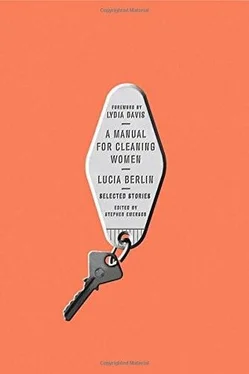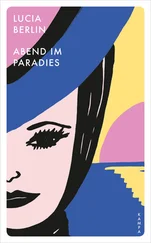“I worked mechanically at my desk, answering phones, calling for oxygen and lab techs, drifting away into warm waves of pussywillows and sweet peas and trout pools. The pulleys and riggings of the mine at night, after the first snow. Queen Anne’s lace against the starry sky.”
About the way a story develops, Alastair Johnston has this insight: “Her writing was cathartic but instead of building to an epiphany, she would evoke the climax more circumspectly, let the reader sense it. As Gloria Frym said in the American Book Review , she would ‘underplay it, surround it and let the moment reveal itself.’”
And then, her endings. In so many stories, Wham! comes the end, at once surprising and yet inevitable, resulting organically from the material of the story. In “Mama,” the younger sister finds a way to sympathize, finally, with the difficult mother, but the last few words of the older sister, the narrator — talking to herself, now, or to us — take us by surprise: “Me … I have no mercy.”
* * *
How did a story come into being, for Lucia Berlin? Johnston has a possible answer: “She would start with something as simple as the line of a jaw, or a yellow mimosa.” She herself goes on to say: “But the image has to connect to a specific intense experience.” Elsewhere, in a letter to August Kleinzahler, she describes how she goes forward: “I get started, & then it’s just like writing this to you, only more legible…” Some part of her mind, at the same time, must always have been in control of the shape and sequence of the story, and the end of it.
She said the story had to be real — whatever that meant for her. I think it meant not contrived, not incidental or gratuitous: it had to be deeply felt, emotionally important. She told a student of hers that the story he had written was too clever — don’t try to be clever, she said. She typeset one of her own stories in hot metal on a Linotype machine, and after three days of work threw all the slugs back into the melting pot, because, she said, the story was “false.”
* * *
What about the difficulty of the (real) material?
“Silence” is a story she tells about some of the same real events she also mentions more briefly to Kleinzahler, in a kind of pained shorthand: “Fight with Hope devastating.” In the story, the narrator’s uncle John, who is an alcoholic, is driving drunk with his little niece in the truck. He hits a boy and a dog, injuring both, the dog badly, and doesn’t stop. Lucia Berlin says, of the incident, to Kleinzahler: “The disillusion when he hit the kid and the dog was Awful for me.” The story, when she turns it into fiction, has the same incident, and the same pain, but there is a resolution of sorts. The narrator knows Uncle John later in his life, when, in a happy marriage, he is mild, gentle, and no longer drinking. Her last words, in the story, are: “Of course by this time I had realized all the reasons why he couldn’t stop the truck, because by this time I was an alcoholic.”
About handling the difficult material, she comments: “Somehow there must occur the most imperceptible alteration of reality. A transformation, not a distortion of the truth. The story itself becomes the truth, not just for the writer but for the reader. In any good piece of writing it is not an identification with a situation, but this recognition of truth that is thrilling.”
A transformation, not a distortion of the truth.
* * *
I have known Lucia Berlin’s work for more than thirty years — ever since I acquired the slim beige 1981 Turtle Island paperback called Angels Laundromat. By the time of her third collection, I had come to know her personally, from a distance, though I can’t remember how. There on the flyleaf of the beautiful Safe & Sound (Poltroon Press, 1988) is her inscription. We never did meet face-to-face.
Her publications eventually moved out of the small-press world and into the medium-press world of Black Sparrow and then, later, of Godine. One of her collections won the American Book Award. But even with that recognition, she had not yet found the wide readership she should have had by then.
* * *
I had always thought another story of hers included a mother and her children out picking the first wild asparagus of early spring, but I have found it only, so far, in another letter she wrote to me in 2000. I had sent her a description of asparagus by Proust. She replied:
Only ones I ever saw growing were the thin crayon-green wild ones. In New Mexico, where we lived outside of Albuquerque, by the river. One day in spring they’d be up beneath the cotton woods. About six inches tall, just right to snap off. My four sons and I would gather dozens, while down the river would be Granma Price and her boys, up river all of the Waggoners. No one ever seemed to see them as one or two inch high, only at the perfect height. One of the boys would run in and shout “Asparagus!” just as somebody was doing the same at the Prices’ and Waggoners’.
* * *
I have always had faith that the best writers will rise to the top, like cream, sooner or later, and will become exactly as well known as they should be — their work talked about, quoted, taught, performed, filmed, set to music, anthologized. Perhaps, with the present collection, Lucia Berlin will begin to gain the attention she deserves.
* * *
I could quote almost any part of any story by Lucia Berlin, for contemplation, for enjoyment, but here is one last favorite:
So what is marriage anyway? I never figured it out. And now it is death I don’t understand.
Introduction by Stephen Emerson
Birds ate all the hollyhock and larkspur seeds I planted … sitting together all in a row like at a cafeteria.
— Letter to me, May 21, 1995
Lucia Berlin was as close a friend as I’ve ever had. She was also one of the most signal writers I’ve ever encountered.
The latter fact is what I want to write about here. Her extraordinary life — its color, its afflictions, and the heroism she showed especially in the fight against a brutal drinking habit — is evoked in the biographical note at the back.
* * *
Lucia’s writing has got snap. When I think of it, I sometimes imagine a master drummer in motion behind a large trap set, striking ambidextrously at an array of snares, tom-toms, and ride cymbals while working pedals with both feet.
It isn’t that the work is percussive, it’s that there’s so much going on.
The prose claws its way off the page. It has vitality. It reveals.
An odd little electric car, circa 1950: “It looked like any other car except that it was very tall and short, like a car in a cartoon that had run into a wall. A car with its hair standing on end.”
The car was tall and short. Elsewhere, outside Angel’s Laundromat, where the travelers go:
Dirty mattresses, rusty high chairs tied to the roofs of dented old Buicks. Leaky oil pans, leaky canvas water bags. Leaky washing machines. The men sit in the cars, shirtless.
And the mother (ah, the mother):
You always dressed carefully … Stockings with seams. A peach satin slip you let show a little on purpose, just so those peasants would know you wore one. A chiffon dress with shoulder pads, a brooch with tiny diamonds. And your coat. I was five years old and even then knew that it was a ratty old coat. Maroon, the pockets stained and frayed, the cuffs stringy.
What her work has, is joy. A precious commodity, not encountered all that often. Balzac, Isaac Babel, García Márquez come to mind.
When prose fiction is as expansive as hers, the result is that the world gets celebrated. Out through the work, a joy radiating off the world. It is writing continuous with the irrepressibility of — humanity, place, food, smells, color, language. The world seen in all its perpetual motion, its penchant to surprise and even delight.
Читать дальше












